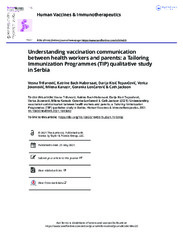Prikaz osnovnih podataka o dokumentu
Understanding vaccination communication between health workers and parents: a Tailoring Immunization Programmes (TIP) qualitative study in Serbia
| dc.creator | Trifunovic, Vesna | |
| dc.creator | Bach Habersaat, Katrine | |
| dc.creator | Kisić Tepavčević, Darija | |
| dc.creator | Jovanović, Verica | |
| dc.creator | Kanazir, Milena | |
| dc.creator | Lončarević, Goranka | |
| dc.creator | Jackson, Cath | |
| dc.date.accessioned | 2023-03-06T20:08:18Z | |
| dc.date.available | 2023-03-06T20:08:18Z | |
| dc.date.issued | 2022 | |
| dc.identifier.issn | 2164-5515 | |
| dc.identifier.issn | 2164-554X | |
| dc.identifier.uri | https://www.tandfonline.com/toc/khvi20/18/1?nav=tocList | |
| dc.identifier.uri | https://dais.sanu.ac.rs/123456789/14208 | |
| dc.description.abstract | Vaccine communication between health workers and parents affects parental acceptance, so understanding this is particularly important when vaccination rates drop. This paper presents the findings of a qualitative research study conducted in Serbia as part of a Tailoring Immunization Programmes (TIP) project. The aims were to explore the process of vaccination communication between health workers and parents (accepting, indecisive, delaying, refusing), and identify barriers and drivers to effective communication. In-depth interviews with 14 health workers were supplemented and qualified by observations of 40 consultations, using thematic analysis. Study sites were two community health centers in two Belgrade municipalities where a significant drop in childhood vaccination rates had occurred. Key findings were: (1) communication mainly took place between pediatricians and parents, while nurses focused on administering vaccines. (2) Health workers were confident in their skills to communicate and address concerns of accepting and indecisive parents, successfully applying specific strategies. (3) When interacting with delaying and refusing parents, they sometimes agreed to delay vaccination to maintain relationships, confident that most parents would vaccinate in due course. (4) Some refusing parents asked questions grounded in a socio-political agenda regarding vaccines or vaccination. Such questions exceeded the domain of health workers’ expertise, which affected the communication between them. (5) Health workers’ behavior in consultations was sometimes affected by parents’ (dis) trust in their recommendations about vaccination. The study revealed that health workers in Serbia require additional skills and techniques to respond to parents who refuse and wish to delay vaccination, to secure timely vaccination. | sr |
| dc.language.iso | en | sr |
| dc.publisher | Taylor & Francis Online | sr |
| dc.relation | Tailoring Immunization Program (TIP) in Serbia, The World Health Organization, Institute of Public Health of Serbia "Dr Milan Jovanović Batut" | sr |
| dc.rights | openAccess | sr |
| dc.rights.uri | https://creativecommons.org/licenses/by/4.0/ | |
| dc.source | Human Vaccines & Immunotherapeutics | sr |
| dc.subject | Tailoring immunization programmes (TIP) | sr |
| dc.subject | health communication | sr |
| dc.subject | vaccination | sr |
| dc.subject | vaccine hesitancy | sr |
| dc.subject | health workers | sr |
| dc.title | Understanding vaccination communication between health workers and parents: a Tailoring Immunization Programmes (TIP) qualitative study in Serbia | sr |
| dc.type | article | sr |
| dc.rights.license | BY | sr |
| dc.citation.spage | e1913962 (8 pages) | |
| dc.citation.volume | 18 | |
| dc.citation.issue | 1 | |
| dc.identifier.wos | 000654053300001 | |
| dc.identifier.doi | 10.1080/21645515.2021.1913962 | |
| dc.identifier.scopus | 2-s2.0-85106401494 | |
| dc.type.version | publishedVersion | sr |
| dc.identifier.fulltext | http://dais.sanu.ac.rs/bitstream/id/56749/bitstream_56749.pdf | |
| dc.identifier.rcub | https://hdl.handle.net/21.15107/rcub_dais_14208 |

